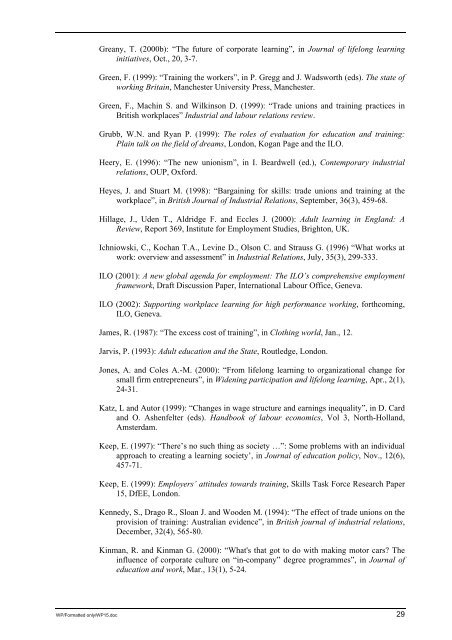Lifelong learning - International Labour Organization
Lifelong learning - International Labour Organization
Lifelong learning - International Labour Organization
Create successful ePaper yourself
Turn your PDF publications into a flip-book with our unique Google optimized e-Paper software.
Greany, T. (2000b): “The future of corporate <strong>learning</strong>”, in Journal of lifelong <strong>learning</strong><br />
initiatives, Oct., 20, 3-7.<br />
Green, F. (1999): “Training the workers”, in P. Gregg and J. Wadsworth (eds). The state of<br />
working Britain, Manchester University Press, Manchester.<br />
Green, F., Machin S. and Wilkinson D. (1999): “Trade unions and training practices in<br />
British workplaces” Industrial and labour relations review.<br />
Grubb, W.N. and Ryan P. (1999): The roles of evaluation for education and training:<br />
Plain talk on the field of dreams, London, Kogan Page and the ILO.<br />
Heery, E. (1996): “The new unionism”, in I. Beardwell (ed.), Contemporary industrial<br />
relations, OUP, Oxford.<br />
Heyes, J. and Stuart M. (1998): “Bargaining for skills: trade unions and training at the<br />
workplace”, in British Journal of Industrial Relations, September, 36(3), 459-68.<br />
Hillage, J., Uden T., Aldridge F. and Eccles J. (2000): Adult <strong>learning</strong> in England: A<br />
Review, Report 369, Institute for Employment Studies, Brighton, UK.<br />
Ichniowski, C., Kochan T.A., Levine D., Olson C. and Strauss G. (1996) “What works at<br />
work: overview and assessment” in Industrial Relations, July, 35(3), 299-333.<br />
ILO (2001): A new global agenda for employment: The ILO’s comprehensive employment<br />
framework, Draft Discussion Paper, <strong>International</strong> <strong>Labour</strong> Office, Geneva.<br />
ILO (2002): Supporting workplace <strong>learning</strong> for high performance working, forthcoming,<br />
ILO, Geneva.<br />
James, R. (1987): “The excess cost of training”, in Clothing world, Jan., 12.<br />
Jarvis, P. (1993): Adult education and the State, Routledge, London.<br />
Jones, A. and Coles A.-M. (2000): “From lifelong <strong>learning</strong> to organizational change for<br />
small firm entrepreneurs”, in Widening participation and lifelong <strong>learning</strong>, Apr., 2(1),<br />
24-31.<br />
Katz, L and Autor (1999): “Changes in wage structure and earnings inequality”, in D. Card<br />
and O. Ashenfelter (eds). Handbook of labour economics, Vol 3, North-Holland,<br />
Amsterdam.<br />
Keep, E. (1997): “There’s no such thing as society …”: Some problems with an individual<br />
approach to creating a <strong>learning</strong> society’, in Journal of education policy, Nov., 12(6),<br />
457-71.<br />
Keep, E. (1999): Employers’ attitudes towards training, Skills Task Force Research Paper<br />
15, DfEE, London.<br />
Kennedy, S., Drago R., Sloan J. and Wooden M. (1994): “The effect of trade unions on the<br />
provision of training: Australian evidence”, in British journal of industrial relations,<br />
December, 32(4), 565-80.<br />
Kinman, R. and Kinman G. (2000): “What's that got to do with making motor cars? The<br />
influence of corporate culture on “in-company” degree programmes”, in Journal of<br />
education and work, Mar., 13(1), 5-24.<br />
WP/Formatted only/WP15.doc 29

















